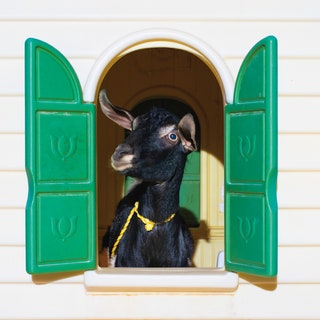The indie band’s 11th album uses a moodier, more subdued palette to get to the heart of some fun topics like fear and ambivalence in the face of environmental and societal ruin.
You are probably having a bad time right now. You have been stuck at home in fits and starts for so long that it’s increasingly difficult to remember what that didn’t feel like. A bad situation that seemed like it was going to end soon didn’t, and now you’re not sure if it ever will—or if it does, it will surely be superseded by something even worse. Maybe you have some sense of what that even worse thing might be, maybe you don’t, but you’re feeling it hovering regardless. Even if you’re the type to find ways to remain hopeful—and God bless you whoever you are—you may concede that the search is getting a little more fraught each day.
Here’s some welcome good news: “If You’re Not Dark,” the last song on Superchunk’s 11th album Wild Loneliness, is the validating feel-bad anthem you didn’t know you needed. It’s a slow-burn climax dedicated to expressing dismay towards anyone who wouldn’t be having a bad time right now. Mac McCaughan sings with Sharon Van Etten, “If you’re not dark/At least in some little part/What are you on?/Can I have some?” They aren’t mad at you for being oblivious or immune to the inherent confusion or existential angst of the times, they’re just jealous.
The righteous fury of 2018’s What a Time to Be Alive channeled the DIY punk of Superchunk’s early days into some real oh-we’ll-give-you-something-to-be-angry-about-all-right circumstances; being pissed about your boss was merely training wheels for being pissed about institutionalized inequality and white supremacy and the fact that your children are doomed. The album felt of the moment in a way none of their work had been asked to be before; Wild Loneliness somehow one-ups it by doing the same with a far more complicated moment.
Wild Loneliness is a deep sigh after their Trump-era primal howl—an admission that if you can’t change the things you’re rightfully mad about, you should channel what’s left of your energy into hanging out while you can with the people who make you feel less bad. It’s bunker-bedroom pop, salve and comfort for the apocalypse we know we’re already in and can’t really stop no matter how loud we’ve tried to yell. Anger is easy to identify and vent; fear and ambivalence in the face of environmental and societal ruin are harder to pogo to.
It is only natural that the overarching theme for an album largely self-recorded by band members in their own North Carolina homes is the idea of home itself, reveling in the mundane as a lifeboat. With string flourishes courtesy of Owen Pallett, opener “City of the Dead” makes a line like “I’ll still make the coffee/And we still make the beds” feel defiant and jubilant, fighting for the right to feel normal for five fucking minutes. “This Night” is an unfairly catchy late-career peak that turns the potentially numbing familiarity of domesticity into the most romantic thing in the world (“This night is like so many/But I still get a thrill when you ring me”) and an end refrain (“Take me/Take me out tonight”) that makes a night away from the kids sound like high adventure.
The equally hooky “Endless Summer” is the most explicitly doomsday-oriented song on the album, a walk in the woods spent contemplating the looming specter of climate disaster that also happens to be an outright bop despite the circumstances. Navigating between despair and delight within the confines of a fuzzy pop song is obviously nothing new; what does feel new is how often we are caught experiencing and processing both at the same time and the relief in recognizing that as a way forward.
The musical tone across the album is closer to Superchunk 1.0’s 2001 swan song Here’s to Shutting Up and its presciently titled predecessor Indoor Living, making the most of mandated isolation to nurture a moodier, more subdued palette than What a Time to Be Alive’s determined racket, and to rope in a bigger cast of outside (and remote) contributors, including Teenage Fanclub’s Norman Blake and Raymond McGinley, Mike Mills, Wye Oak’s Andy Stack, and Camera Obscura’s Tracyanne Campbell. At the time, HTSU’s slower pace and emphasis of keyboards over guitars felt marked by both possibility and frustration—a band chafing against the yoke of expectations, grappling with how to gracefully entwine the culture and chaos of living in a scrappy rock band in the face of late-onset adulthood.
Half a long career later, strings and horns and acoustic ballads don’t feel like a reaction to or deviation from an established style of clatter, they feel like part of the living room. Superchunk have continually applied the lessons and practices of their youth to less youthful endeavors and in the process turned themselves from a great and admirable and well-loved band into a generationally capital-I Important one. And Wild Loneliness is the natural endpoint of this long interrogation—the product of a band whose confidence in their own reason for being feels like a beacon.



0 comments:
Post a Comment